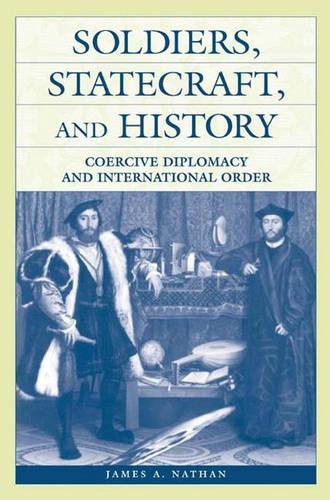
Soldiers, Statecraft, and History: Coercive Diplomacy and International Order
(Paperback)
Available Formats
Publishing Details
Soldiers, Statecraft, and History: Coercive Diplomacy and International Order
By (Author) James A. Nathan
Bloomsbury Publishing PLC
Praeger Publishers Inc
30th August 2002
United States
Classifications
Tertiary Education
Non Fiction
Warfare and defence
General and world history
327.73
Winner of Choice Outstanding Academic Title, 2003 2002
Physical Properties
Paperback
224
Width 156mm, Height 235mm
369g
Description
The increasing capacity of states to muster violence, military power as a meaningful instrument of foreign policy, and the frequent episodic collapse of that power are considered. The increasing capacity of states to muster violence, the concomitant rise of military power as a meaningful instrument of foreign policy, and the frequent episodic collapse of that power are considered in this examination of force, order, and diplomacy. Nathan points to periods of relative order and stability in international relations-the time immediately prior to the rise of Frederick the Great, for example, or the half century after the Napoleonic Wars-as times when states have been most vulnerable to "spoilers" and "rogues." Only the power of the Cold War blocs fostered durable order. Now, notwithstanding novel elements of globalization, international relations appear as dependent as ever on the prudent management of force. Students, scholars, and soldiers are frequently exposed to Clausewitz, Westphalia, Napoleon, World War I, and the like. But what makes these events and individuals so important This book is Clausewitz's successor, insisting that soldiers and statesmen know and master the integrative potential of force. Nathan provides a narrative account of the people and events that have shaped international relations since the onset of the state system. He asserts that an understanding of the limits and utility of persuasion, as well as the corresponding limits and utility of force, will help assure national security in a world filled with more uncertainties than ever in the last 50 years.
Reviews
"James Nathan has written a magisterial account of force, order, and diplomacy from the Peace of Westphalia to the war against terrorism. His deft use of Clausewitzian insights show how states that fail to place political limits on their use of violence have repeatedly suffered disaster... This engaging and sophisticated book will appeal to a wide audience wishing to learn about the necessity of subordinating military force to political purpose." Richard A. Melanson, Professor, National Defense University; "Nathan has gracefully written a book on coercive power from a historical perspective. Readers will come away with a better understanding of historical events and leading figures that are often referenced but not well understood....a must-read for students and scholars of diplomacy." Charles Tien, Associate Prof., Hunter College; "The use of force in international relations has sharply divided the American body politic. The Left has argued or hoped that the role of force would sharply decline or even disappear in the age of globalization and post-Cold-War politics. The Right, for its part, at times seems to suggest that force alone will secure America's international role as it pushes the United States to downgrade international institutions and eschew international obligations. James A. Nathan offers a balanced, scholarly corrective to either excess and perhaps points the way to a more balanced and constructive US foreign policy in the future." Bill Maynes, President, Eurasia Foundation; "...an exceptionally well written and insightful treatment of perhaps the central issue in current American foreign policy debates: the...relationship between national interest, military force, and political influence....the book makes an important and unique contribution to our understanding of the history of the use of military force which can only help us better assess its proper use in the future." Robert L. Gallucci, Dean, Edmund A. Walsh School of Foreign Service, Georgetown University
Author Bio
James A. Nathan is Khaled bin Sultan Eminent Scholar and Professor of International Relations at Auburn University. His most recent book is Anatomy of the Cuban Missile Crisis (Greenwood, 2000).
